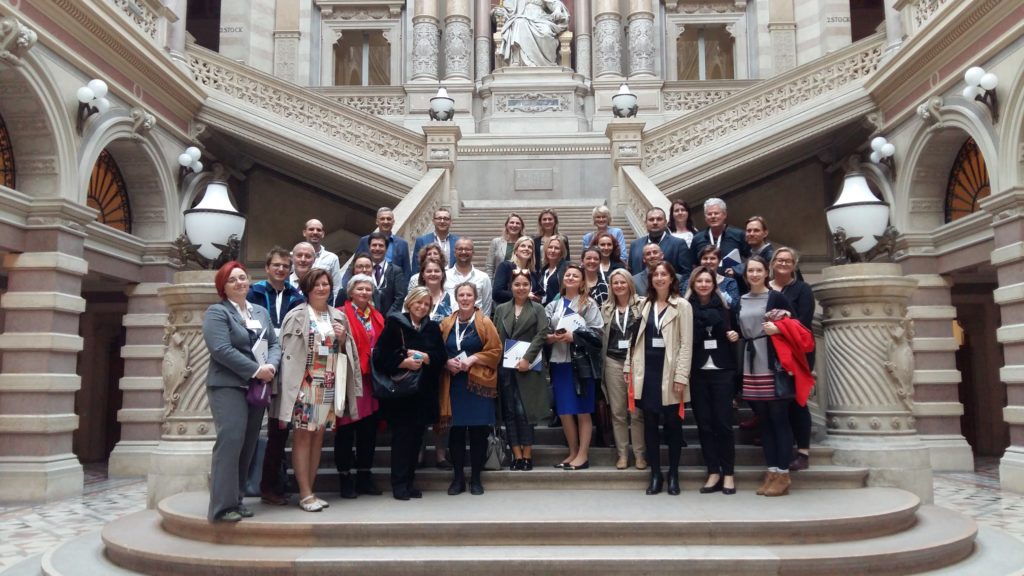Vienna, 11-12 April 2018
To mark the end of the initial two year working mandate of the EuroPris Family Relations Expert Group, EuroPris held a workshop on the topic on 11-12 April 2018, hosted by the Austria Federal Ministry for Constitution, Reform, Regulation and Justice.
Meeting on an annual basis and collaborating in the interim, the Expert Group—with its members from eleven European prison administrations (Czech Republic, Croatia, Ireland, Norway, Sweden, Finland, Austria, Catalonia, Scotland, Romania and Slovenia)—explored examples of good practice across Europe on maintaining family ties when a family member is imprisoned. In order to involve all EuroPris members, the group used EuroPris’ excellent Knowledge Management System (KMS) to pose questions to other prison administrations regarding family relations. Most of the responses can be viewed online at the address below[ref]https://www.europris.org/epis/kms/[/ref].
Children of Prisoners Europe (COPE) represented by Lucy Gampell (President) and Madelein Kattel (Board member) has been an honorary member of the Expert Group since its creation and contributed to the Good Practice Collection on family relations produced in 2017.
Following the timely adoption by the Committee of Ministers of the Council of Europe Recommendation on children with imprisoned parents on 4 April, the Vienna workshop took this as a central focus. Keynote speakers Vivian Geiran (Director, Irish Probation Service and former Chair of the Council for Penological Co-operation, PC-CP, that drafted the Recommendation) and Kate Philbrick (COPE Board member and expert advisor to the PC-CP), put the Recommendation in context, underlined its importance and highlighted its key principles and articles. COPE members Kate Philbrick, Ria Wolleswinkel and Aisling Parkes were thanked by Vivian Geiran for their key advisory support throughout the drafting process and a special mention went to COPE President Lucy Gampell for her memorable presentation at the PC-CP’s 2015 Conference of Directors of Prison and Probation Services, which sparked the transnational and Council of Europe momentum which ultimately led to the drafting and adoption of the Recommendation. Attila Juhasz, current Vice-Chair of the PC-CP and also a member of COPE, was thanked alongside Jan Kleijssen (Director of the Council of Europe’s Information Society and Action against Crime Directorate) for his pivotal role in initiating the Recommendation’s drafting process.
Throughout the two-day workshop, discussions came back to “next steps” and how to move forward towards implementing the Recommendation’s 56 articles. Delegates—for the most part representatives from national prison administrations but also COPE member NGOs POPS (England and Wales), Bufff (Sweden) and RODA (Croatia)—looked at both the practicalities of implementing key articles and at examples of good practice already in place in their prison systems. Vivian Geiran cautioned that, “although the Recommendation has the weight of the 47 [Council of Europe] Member States behind it, we shouldn’t be complacent and shouldn’t think there are no challenges ahead”.
During her introduction, Kirsten Hawlitschek—EuroPris Executive Director—underlined the importance for prisoners and their families to stay connected and welcomed the publication of the Recommendation. She also underlined the importance of balancing need against risk and of relying on partnerships with non-governmental organisations. She encouraged the fifty participants from twenty-five European countries to make use of both EuroPris and COPE while implementing the Recommendation on the national level, urging them to be ready to take some risks, for the greater benefit of those impacted (prisoners and their families).
The various COPE representatives who were present were encouraged by the interest and support for the topic from within both EuroPris and its national prison administration members. Although the Expert Group has come to the end of its two-year mandate, it is hoped that its work will continue even if the group assumes a different form, and that COPE will continue to be involved. Several representatives from the prison administrations present approached COPE to explore membership, which we very much welcome.
All presentations can be accessed on the EuroPris website at the following address: https://www.europris.org/expert_groups/family-relations/


